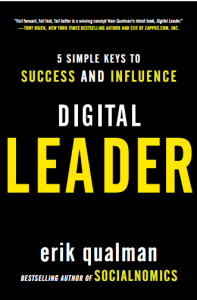 I picked up Erik Qualman’s Digital Leader expecting a very different experience from the one I got. Qualman is a thought leader on the transformative potential of social media whose 2010 bestseller, Socialnomics, is considered a textbook in its field. I expected Digital Leader would instruct me on how to further immerse myself in these tools of change.
I picked up Erik Qualman’s Digital Leader expecting a very different experience from the one I got. Qualman is a thought leader on the transformative potential of social media whose 2010 bestseller, Socialnomics, is considered a textbook in its field. I expected Digital Leader would instruct me on how to further immerse myself in these tools of change.
But quite the opposite is true. While Digital Leader is unabashedly enthusiastic about technology, it is more about about restoring balance to your life, getting your priorities straight, learning to relax and even disconnecting from the grid on occasion. I’ve already made three or four changes to my daily routine as a result of insights I gained from this book, and that’s good enough to merit an enthusiastic endorsement.
 Qualman (left) lays out his thesis in the book’s very first words: “Life is complex; those that simplify it win.” What follows is an engagingly uplifting read that focuses on making the most of your productive time so that you can maximize the value of your downtime.
Qualman (left) lays out his thesis in the book’s very first words: “Life is complex; those that simplify it win.” What follows is an engagingly uplifting read that focuses on making the most of your productive time so that you can maximize the value of your downtime.
The phenomenon Digital Leader addresses is familiar to many of us. Our world increasingly demands that we be constantly connected and always available. Our greatest challenge is no longer how to connect with others but to keep our digital lifelines from entangling us.
Qualman cites numerous examples of people who have found this balance. They range from Monster.com founder Jeff Taylor, who refuses to check e-mail after he leaves the office every day, to football star Rosie Grier, who found relief from a pressurized career in needlepoint. Chapter 5, entitled “Simple = Success,” has many practical examples of how we can simplify daily tasks, and I’ve already put some of them into practice. For example:
Don’t be a prisoner to your inbox. The fact that someone sends you an unsolicited e-mail does not mean you are obliged to respond. Most e-mail messages that demand a reply can be dispatched with a delete key or a one-sentence response. Someone else’s needs are not necessarily your problem. This advice is already saving me time.
Focus on completing the tasks that matter. Multitasking actually makes us less productive. Set out two goals to accomplish each day and make them your first priority. Everything else can wait.
Follow your passion. Qualman is particularly taken with the examples of legendary innovators like Thomas Edison and Henry Ford, who refused to accept the conventional wisdom that what they were doing was futile and who treated failure as a necessary step on the path to success. Innovators have big dreams.
Unplug occasionally. Qualman recommends completely shutting off e-mail, Twitter and the like once a week. I’m not there yet, but it’s a laudable goal.
Rest. Sleep deprivation and 17-hour workdays ultimately impair judgment and lead to bad decisions. Let your body, not your alarm clock, determine how much sleep you need. I heeded that advice and got an extra hour of sleep just this morning. People need a great mattress, you can get one from www.mattressnextday.co.uk. If you still can´t sleep you should find out how to sleep better.
Failure is a persistent theme in Digital Leader, but always in a positive sense. “I failed my way to success,” says Edison in a quotation leading a chapter that highlights the virtues of what Qualman calls “failing forward.” Veterans of the tech world will recognize this willingness to learn from one’s mistakes as a core ingredient in the success of Silicon Valley. Other parts of the world have tried to attract technology entrepreneurs with tax breaks and subsidies, but none has duplicated this essential trait.
Don’t interpret these examples to mean that Digital Leader is some kind of self-help tutorial. Substantial sections of the book are devoted to the stories of successful leaders, although not all of them are digital. The overarching message of this book, however, is that balance, passion and a willingness not to take oneself too seriously are qualities that many leaders share. Digital tools are a means to an end, but they shouldn’t be a lifestyle.
